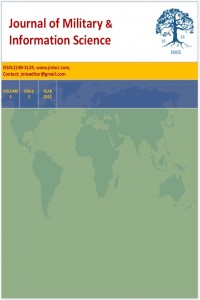Öz
The issue of burden sharing in collective defense in the past and present has been the fundamental reason of the rivalries in NATO between Americans and Europeans. Fair burden-sharing focused on preventing the Communist expansion throughout the Cold War. After the Cold War focus of discussions shifted toward providing money and troops for the crisis management, security building, peace support operations, and war against terrorism. This article argues that burden sharing problem in NATO has two major dimensions; (1) every member country struggles to shift some of the burden it carries to others, (2) decisions are made according to the extent of the contribution to the alliance. Since the United States is undoubtedly the major contributor by far, American efforts of shifting some burden to other members and European reaction to American hegemony in the decision making processes are two major elements engendering crises in the organization. These two major consequences of burden sharing rivalries are affected by both international and domestic constraints as well as personalities.
Anahtar Kelimeler
Kaynakça
- Anessa L. Kimball. (2010). Political Survival, Policy Distribution, and Alliance Formation. Journal of Peace Research, Vol. 47, No. 4 , 417.
- Chalmers, M. (2001). The Atlantic Burden-Sharing Debate - Widening or Fragmenting? Royal Institute of International Affairs , 573.
- Ellen Hallams And Benjamin Schreer. (2012). Towards a post-American alliance? NATO burden-sharing after Libya. International Affairs 88: 2 , 317.
- Elrod, J. R. (1989). NATO Burden Sharing and the Forces of Change. International Studies Quarterly, Vol. 33, No. 4 , 436.
- Gheciu, A. (2005). NATO in the “New Europe. Stanford University Press.
- Gonzalez-Pelaez, B. B. (2005). 'International Community' after Iraq. International Affairs (Royal Institute of International Affairs 1944-, 13.
- Gordon, L. (1956). Economic Aspects of Coalition Diplomacy-The Nato Experience . International Organization, Vol. 10, No. 4, 531.
- Gordon, P. H. (2002). NATO and the War on Terrorism a Changing Alliance. The Brookings Review, Vol. 20, No. 3.
- Ian Q.R. Thomas. (1997). The Promise of the Alliance. Maryland: Rowman&Littlefield Publishers.
- Jordan, R. S. (2000). Norstad Cold War NATO Supreme Commander. New York: St. Martin’s Press.
- Menon, A. (2000). France, NATO and the Limits of Independence 1981-97, The politics of Ambivalance. New York: St.Martin’s Press,Inc.
- Stanley R. Sloan. (2010). NATO and the Transatlantic Bargain from Truman to Obama. New York: The Continuum International Publishing Group.
- Talbott, S. (2002). From Prague to Baghdad: NATO at Risk. Foreign Affairs, Vol. 81, No. 6.
- Thies, W. J. (2003). Friendly Rivals, Bargaining and Burden-Shifting in NATO. New York: M.E. Sharpe,Inc.
- Treaty, N. A. (1949). Washington D.C.
- Zeckhauser, M. O. (1966). An Economic Theory of Alliances’, Review of Economics and Statistics.
Öz
Kaynakça
- Anessa L. Kimball. (2010). Political Survival, Policy Distribution, and Alliance Formation. Journal of Peace Research, Vol. 47, No. 4 , 417.
- Chalmers, M. (2001). The Atlantic Burden-Sharing Debate - Widening or Fragmenting? Royal Institute of International Affairs , 573.
- Ellen Hallams And Benjamin Schreer. (2012). Towards a post-American alliance? NATO burden-sharing after Libya. International Affairs 88: 2 , 317.
- Elrod, J. R. (1989). NATO Burden Sharing and the Forces of Change. International Studies Quarterly, Vol. 33, No. 4 , 436.
- Gheciu, A. (2005). NATO in the “New Europe. Stanford University Press.
- Gonzalez-Pelaez, B. B. (2005). 'International Community' after Iraq. International Affairs (Royal Institute of International Affairs 1944-, 13.
- Gordon, L. (1956). Economic Aspects of Coalition Diplomacy-The Nato Experience . International Organization, Vol. 10, No. 4, 531.
- Gordon, P. H. (2002). NATO and the War on Terrorism a Changing Alliance. The Brookings Review, Vol. 20, No. 3.
- Ian Q.R. Thomas. (1997). The Promise of the Alliance. Maryland: Rowman&Littlefield Publishers.
- Jordan, R. S. (2000). Norstad Cold War NATO Supreme Commander. New York: St. Martin’s Press.
- Menon, A. (2000). France, NATO and the Limits of Independence 1981-97, The politics of Ambivalance. New York: St.Martin’s Press,Inc.
- Stanley R. Sloan. (2010). NATO and the Transatlantic Bargain from Truman to Obama. New York: The Continuum International Publishing Group.
- Talbott, S. (2002). From Prague to Baghdad: NATO at Risk. Foreign Affairs, Vol. 81, No. 6.
- Thies, W. J. (2003). Friendly Rivals, Bargaining and Burden-Shifting in NATO. New York: M.E. Sharpe,Inc.
- Treaty, N. A. (1949). Washington D.C.
- Zeckhauser, M. O. (1966). An Economic Theory of Alliances’, Review of Economics and Statistics.
Ayrıntılar
| Birincil Dil | İngilizce |
|---|---|
| Bölüm | Reports |
| Yazarlar | |
| Yayımlanma Tarihi | 2 Şubat 2015 |
| Yayımlandığı Sayı | Yıl 2015 Cilt: 3 Sayı: 2 |


